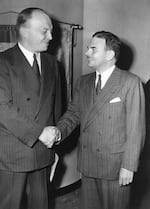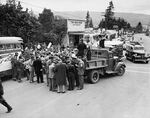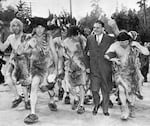It’s a presidential election year and Oregon finds itself thrust into the national political spotlight. Two candidates prepare to go toe-to-toe in a presidential debate, hoping to win the hearts and minds of the American people.
But the year isn’t 2020. It’s 1948.
The contenders: Gov. Thomas E. Dewey of New York, versus former Gov. Harold Stassen of Minnesota. The two men vied to win the Republican nomination just days before the last 1948 presidential primary. The medium: radio broadcast. While the 1960 debate between Richard Nixon and JFK is remembered as the granddaddy of televised presidential debates, this 1948 face-off was the nation’s first-ever live broadcast presidential debate and is often credited with setting the modern standard for such debates. The topics: well, just one, actually. In a parallel with today’s political discourse, the candidates discussed the foreign influence of the Soviet Union. The venue: Portland, Oregon.
“Like so many things that are wonderful in our history, this happened by mistake,” A.J. Baime told OPB’s “All Things Considered.” He wrote about the Dewey-Stassen debate in his book, “Dewey Defeats Truman: The 1948 Election and the Battle for America’s Soul.”

Harold Stassen, former Minnesota Governor, left, and New York Gov. Thomas E. Dewey shake hands before the Oregon Republican Presidential Primary debate at KEX-ABC radio station in Portland, Ore., May 17, 1948.
Associated Press / OPB
Dewey was considered the clear frontrunner at the outset of the 1948 election cycle. In fact, he’d been the GOP presidential nominee four years earlier, although he was defeated by President Franklin D. Roosevelt. But suddenly Harold Stassen, “this boy wonder of Minnesota” and the state’s youngest governor in history, began racking up primary wins in Wisconsin, Nebraska, West Virginia and Pennsylvania. Soon, the frontrunner and the dark horse found themselves pretty much tied going into the nation’s last primary in Oregon.
“A lot of people are thinking that whoever wins the Oregon primary is not just going to win the Republican nomination, but everybody is sure that the Republicans are going to win in November,” Baime said. “So really, the Oregon primary, everybody believed, was going to decide who the next president was going to be.”
Related: Oregon was the first state to vote by mail in a presidential election
With the candidates neck-and-neck, the stakes high and the clock ticking, it was decided that Dewey and Stassen would debate on live radio, four days ahead of the state primary. Forty million people across the country tuned in to the broadcast. The debate was produced by Portland ABC radio affiliate KEX, and was moderated by the chairman of the Multnomah County Republicans, Donald R. Van Boskirk.
Modern debate viewers are accustomed to hearing candidate positions on a variety of topics — health care, the economy, foreign policy, human rights, education, and so on — and rapid-fire responses limited to a couple of minutes, or even seconds. The 1948 debate was more focused. The single question was this: “Should the Communist Party be outlawed?”
“People should remember, this is at the very beginning of the Cold War, and we’re just realizing that the Soviets are our enemies,” Baime said.

Harold Stassen is seen among a crowd of voters on the campaign trail in Cascade Locks, Ore. in May 1948.
CARL E. VERMILYA / Oregon Historical Society
Stassen went first, with 20 minutes to argue the position that communism indeed should be outlawed.
“He begins talking about his war experience and how scary war is, and how he believed we were on the brink of World War III,” Baime said. “And if we don’t outlaw communism, this threat to our country is going to emerge and really destabilize us as a country, and it should be banned.”
As Stassen put it himself in 1948: “I have reached the conclusion that the communist organizations of the world are absolutely directed by the rulers in Russia, in the Kremlin. The objectives of these communist organizations in the world are to overthrow free government, to destroy the liberties of men and to bring other countries under the domination of the dictators of Russia.”

Thomas E. Dewey campaigns with the Oregon Cavemen Club in Grants Pass, Ore. in May of 1948.
Acme Newspictures (New York; N.Y.). / Oregon Historical Society
Dewey was next. Although he was also an anti-communist, he held the position, which he argued for his allotted 20 minutes, that communism should not be outlawed.
“Dewey says, no way. If we outlaw communism, we’re going to make ourselves into the police state that is our enemy,” Baime said. “We’re going to take away the most important part of our democracy, and that’s our freedom.”
In Dewey’s words: “We cannot consistently criticize the communist government of Europe for suppressing opposition political parties if we resort to the same totalitarian methods here.”
By outlawing communism, Dewey went on to argue, the U.S. would only drive communists further into secrecy, making them that much more dangerous, and possibly advancing communism rather than deterring it. He concluded by listing 27 existing laws he said could be used to fight communism without banning it outright and eroding American political freedom.
As a debater, Dewey had the advantage. He was a seasoned prosecutor, so the point-counterpoint format of the debate came naturally to him.
“Stassen goes first, and when it’s Dewey’s time to speak, everybody realizes that Stassen has made a grave error by even agreeing to be in this debate because Thomas Dewey, he came up as a lawman,” Baime said. “Dewey just kills him.”
Dewey won the primary handily a few days later and went on to face Harry Truman in the 1948 general election. As students of American history may know, contrary to the proclamation of the infamously photographed newspaper headline “Dewey Beats Truman,” Truman, in fact, beat Dewey.
As for “boy wonder” Stassen, his 1948 primary defeat left him undeterred.
“He goes on to run for president eight more times. Never wins, but he never came as close as he was in 1948,” Baime said.
Related: President Donald Trump’s bold plans didn’t change Oregon’s economic trajectory
As 2020 has found Portland in the mouths of debating presidential candidates, the focus on Oregon in the heated last days of the 1948 primaries is just one aspect of the Dewey-Stassen debate that feels uncannily familiar. Then, like now, foreign interference by the Russians was of great concern to electoral politics. There are other parallels between these two election years, too.
“There was a surge of white supremacy, a surge of Black protest,” Baime said. “There was a new form of media and television. Today, we have social media and television that shapes the political ideologies of millions and millions of Americans.”
But the tone of the 1948 debate perhaps sets it apart from what has been, so far, a rancorous and chaotic 2020 presidential debate cycle, beset by interruptions and outbursts from President Trump and one pesky little fly.
“When I listen to [the Dewey-Stassen] debate, clearly these opponents are going after each other. But there’s so much respect in the dialogue and the discourse, because it’s so clear that each really respects the other as an American patriot, and each respects that the other is trying to do what he believes is the best for our country,” Baime said. “It’s a wonderful thing to listen to.”